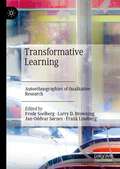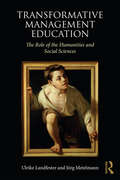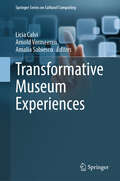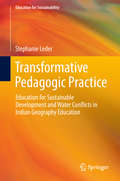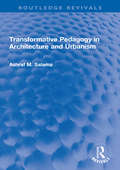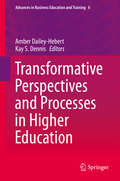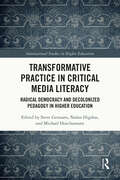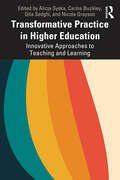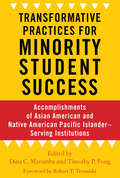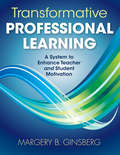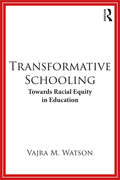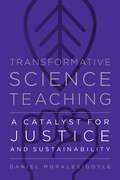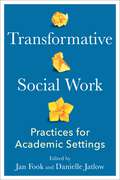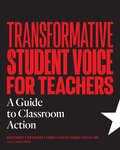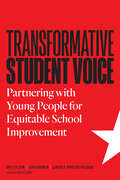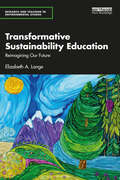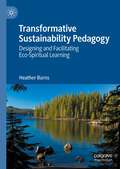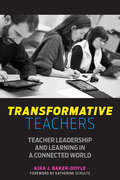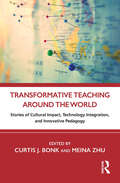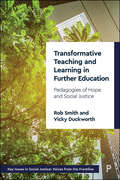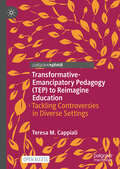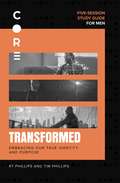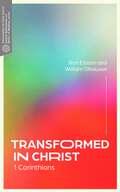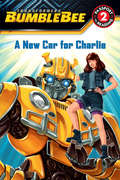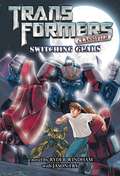- Table View
- List View
Transformative Learning: Autoethnographies of Qualitative Research
by Larry D. Browning Frode Soelberg Jan-Oddvar Sørnes Frank LindbergThis book contains a series of autoethnographies written by participants of a program on qualitative methods. It offers the stories of students-turned-professors and what they learned via autoethnographic writing as part of the course. The chapters provide insight into the application of a range of qualitative research techniques and, unlike typical works on qualitative methods, in a nonprescriptive method that reflects a personal learning process. This book will be of interest to students and academics engaged in qualitative research, as well as scholars of transformative learning, teaching pedagogy and broader educational studies.
Transformative Management Education: The Role of the Humanities and Social Sciences (Routledge Advances in Management and Business Studies)
by Ulrike Landfester Jörg MetelmannDue to the recent global financial crises, academic business schools have come in for much criticism, having, in the eyes of the public, failed in their responsibility to society by teaching future managers only how to increase their personal gain without any consideration as to their actions’ social and cultural consequences. Realising that there is a pressing need to innovate their educational offers accordingly, business schools are beginning to turn to the humanities and social sciences to improve on the understanding and thus the teaching of management. This book is the result of an empirical study conducted at eight academic business schools that either already practise or are beginning to practise linking management education to the humanities and social sciences. Gathered mostly in interviews our research team conducted during site visits to these schools, the material presented shows three major fields of concern: how to shift the focus from instrumental to transformative learning, how to reframe the concept of disciplinary subject matter towards a more relational understanding of knowledge—especially in the light of the impact digitalisation is having on education—and how to address the organisational, as well as the political consequences of management education turning towards the inclusion of the humanities and social sciences strategically. The findings indicate that the humanities and social sciences indeed offer knowledge which can significantly help management education with meeting the challenges of the twenty-first century. Innovating management education by making it part of its program portfolios proves a challenge in and of itself in the face of a university system which still determinedly clings to disciplinary segregation. Reforming management education towards an engagement with fields of knowledge traditionally at best ignored and at worst vilified as being completely useless in the "real world" may therefore place academic business schools at the forefront of a movement that is beginning to reshape the educational landscape as a whole. This book will be of value to researchers, academics and students in the fields of business, management studies, organisational studies and education studies.
Transformative Museum Experiences (Springer Series on Cultural Computing)
by Arnold Vermeeren Licia Calvi Amalia SabiescuFollowing on the volume Museum Experience Design (2018), this book acknowledges the changing role of museums in society with a focus on designing experiences as vehicles for transformation. We look at transformation through a systemic perspective, anchored in the experience that museums offer to visitors. One facet of our exploration regards the museum experience itself as an instrument for change. At this level we conceptualise what we mean by a transformative experience and look at design approaches specifically geared towards inducing transformation. We then turn attention towards the way recent changes in the socio-political and cultural context reverberated in structural and functional changes inside the museum and connected institutions and communities, with shifting museum identities and new forms of cooperation emerging. Finally, we zoom in on the role of technology in the making of transformative museum experiences, looking at opportunities and affordances but also calling for an ethical approach to integration of technology in museum practice.
Transformative Pedagogic Practice: Education for Sustainable Development and Water Conflicts in Indian Geography Education (Education for Sustainability)
by Stephanie LederThis book explores how the transnational Education for Sustainable Development (ESD) policy is being translated into formal school education in India. Stephanie Leder investigates the ESD’s transformative potential for pedagogic practice and builds a set of principles for how the global objectives of the ESD can be interpreted in diverse socio-cultural contexts. Her approach for transformative pedagogic practice emphasizes the promotion of a critical consciousness through argumentation skills. Using the case of water conflicts in geography education in India, the book reveals the contradictions between ESD objectives and curricula, syllabi, textbooks and classroom teaching at secondary schools in Pune, Maharashtra. Leder’s approach demonstrates how principles of schooling can be altered towards learner-centered, problem-posing and network-thinking teaching approaches to empower students towards reflective decision-making on the sustainable use of natural resources.
Transformative Pedagogy in Architecture and Urbanism (Routledge Revivals)
by Ashraf M. SalamaFirst published in 2009, Transformative Pedagogy in Architecture and Urbanism is a detailed round of pedagogical dialogue on architecture and urbanism that reset the stage for debating future visions of transformative pedagogy and its impact on design education. Structured in five chapters the book presents a wide range of innovative concepts and practical methodologies for teaching architectural and urban design. It traces the roots of architectural education and offers several contrasting ideas and strategies of design teaching practices. Transformative Pedagogy in Architecture and Urbanism will appeal to those with an interest in architectural and urban design, and architectural and design education.
Transformative Perspectives and Processes in Higher Education
by Amber Dailey-Hebert Kay S. DennisThis book aims to provide insight into the complexities confronting higher education today and to highlight tangible opportunities that exist to address such issues. We are in a constant state of flux and higher education needs to respond in more proactive, intentional and innovative ways to remain a relevant cornerstone to society and culture. The editors begin by asking how our collective reality might change if the complexity and uncertainty surrounding us were embraced and leveraged to serve the learner and society as a whole. They invite the reader to explore collaborative approaches to individualized learning pathways, networked learning and a reimagined ecosystem of academia. The chapters are arranged to inform the reader seeking knowledge on how to 1) reshape and redefine the 21st century university, with its evolving role in these transformative times; 2) design and implement courses that address the changing needs of the university and the non-traditional student; and 3) utilize research on innovative strategies with processes that promote organizational learning. The chapters profile the fluid nature of learning as it evolves in higher education and the workplace, often with a blurred line separating the two environments. Exciting ideas related to heutagogy, problem-based learning, innovative constructivist strategies, authentic learning and self-regulated learning all converge in this volume.
Transformative Practice in Critical Media Literacy: Radical Democracy and Decolonized Pedagogy in Higher Education (International Studies in Higher Education)
by Michael Hoechsmann Nolan Higdon Steve GennaroTransformative Practice in Critical Media Literacy brings together a diverse selection of essays to examine the knowledge production crisis in higher education and the role that news media and technology play in this process.This text highlights the importance of radical pedagogy and critical media literacy to fight back and reclaim higher education as the battleground for democracy and the embodiment of citizenship. Using a global and social justice lens, it explores the transformative potential of critical media literacy in higher education. It also provides real examples of current critical media literacy practices around the globe and of successful experiences inside classrooms. In an era of fake news, this text fulfils the yearning for critical media literacy to permeate higher education by drawing together practitioners and scholars speaking to journalism students, teacher candidates, and to students, scholars, and activists across a variety of spaces in higher education.This book will be a key resource for scholars, students, policymakers, community members and activists interested in education, politics, youth studies, critical theory, intersectionality, social justice and peace studies, activism, critical media literacy, communication, or media studies.
Transformative Practice in Higher Education: Innovative Approaches to Teaching and Learning
by Alicja Syska Carina Buckley Gita Sedghi Nicola GraysonThis insightful book transforms crisis reflections into longer term guidance for a responsive, engaged pedagogy within contemporary higher education (HE).In recent years, HE institutions worldwide have seen a seismic shift that has compelled them to rapidly transition to online and blended learning models. This book captures the ingenuity and resilience of educators who not only weathered the storm but emerged from it with innovative practices that have permanently transformed the landscape of teaching and learning in universities.Through interdisciplinary accounts and scholarly perspectives across diverse disciplines and geographies, it highlights care, creativity, and resilience in practices that build community, support learners, and foster engaged learning. Each chapter offers enduring lessons for learner-centred, responsive pedagogy, detailing innovations that practitioners permanently integrated across delivery formats.This key title is written for HE practitioners across the globe, whether they are teaching in the context of a subject discipline or identify themselves as blended or integrated professionals. Its insights will provide inspiration, guidance, and points for reflection for all those who wish to engage with critical pedagogies and long-term transformation in contemporary HE.
Transformative Practices for Minority Student Success: Accomplishments of Asian American and Native American Pacific Islander–Serving Institutions
by Dina C. Maramba, Timothy P. Fong, Robert T. TeranishiBetween 2000 and 2015 the Asian American Pacific Islander population grew from nearly 12 million to over 20 million--at 72% percent recording the fastest growth rate of any major ethnic and racial group in the US.This book, the first to focus wholly on Asian American and Native American Pacific Islander Institutions (AANAPISIs) and their students, offers a corrective to misconceptions about these populations and documents student services and leadership programs, innovative pedagogies, models of community engagement, and collaborations across academic and student affairs that have transformed student outcomes.The contributors stress the importance of disaggregating this population that is composed of over 40 ethnic groups that vary in immigrant histories, languages, religion, educational attainment levels, and socioeconomic status. This book recognizes there is a large population of underserved Asian American and Pacific Islander college students who, given their educational disparities, are in severe need of attention. The contributors describe effective practices that enable instructors to validate the array of students’ specific backgrounds and circumstances within the contexts of developing such skills as writing, leadership and cross-cultural communication for their class cohorts as a whole. They demonstrate that paying attention to the diversity of student experiences in the teaching environment enriches the learning for all. The timeliness of this volume is important because of the keen interest across the nation for creating equitable environments for our increasingly diverse students.This book serves as an important resource for predominantly white institutions who are admitting greater numbers of API and other underrepresented students. It also offers models for other minority serving institutions who face similar complexities of multiple national or ethnic groups within their populations, provides ideas and inspiration for the AANAPISI community, and guidance for institutions considering applying for AANAPISI status and funding. This book is for higher education administrators, faculty, researchers, student affairs practitioners, who can learn from AANAPISIs how to successfully engage and teach students with widely differing cultural backgrounds and educational circumstances.
Transformative Professional Learning: A System to Enhance Teacher and Student Motivation
by Dr Margery B. GinsbergMotivation is foundational to learning This book’s bold new vision for professional learning emphasizes the importance of intrinsic motivation and respect for cultural diversity. Knowing that culture and motivation are inseparable influences on learning, Margery B. Ginsberg provides practical steps for teaching and learning that are grounded in the reality of students' lives. The program’s processes include: Shadowing students to help sharpen teachers’ understanding of student motivation. Conducting home visits to better connect with students’ lives and families Collaborating with other teachers to design lessons Analyzing data in collaboration with students, families, and community members
Transformative Schooling: Towards Racial Equity in Education
by Vajra M. WatsonDiscussions of achievement gaps are commonplace in education reform, but they are rarely interrogated as a symptom of white supremacy. As an act of disruption, award-winning scholar Vajra Watson pierces through the rhetoric and provides a provocative analysis of the ways schools can become more racially inclusive. Her research is grounded in Oakland where longitudinal data demonstrated that Black families were sending their children to school, but the ideals of an oasis of learning were being met with the realities of racism, low expectations, and marginalization. As a response to this intergenerational crisis of miseducation, in 2010, the school district joined forces with community organizers, religious leaders, neighborhood elders, teachers, parents, and students to address institutionalized racism. Seven years later, Watson shares findings from her investigation into the school district’s journey towards justice. What she creates is a wholly original work, filled with penetrating portraits that illuminate the intense and intimate complexities of working towards racial equity in education. As a formidable case study, this research scrutinizes how to reconfigure organizational ecosystems as spaces that humanize, heal, and harmonize. Emerging from her scholarship is a bold, timely, and hopeful vision that paves the way for transformative schooling.
Transformative Science Teaching: A Catalyst for Justice and Sustainability
by Daniel Morales-DoyleA call to action championing equity and social justice in K–12 science curriculum
Transformative Social Work: Practices for Academic Settings
by Fook, Jan; Jatlow, DanielleTransformative approaches to social work have been popular for some time. Most discussions of this perspective, however, focus on actual practice with clients or service users, not educational contexts. In addition, there is often a lack of clarity about what “transformative” really means, both in theory and in practice.This book brings together a range of contributors to reconsider transformative social work, focusing on concrete examples in academic settings both inside and outside the classroom. They illustrate theories and practices of transformative social work in the academy in detail from different standpoints. Chapters by scholars at all career stages, students, staff, and managers consider all aspects of academic work—teaching and learning, research, and administration—as well as labor that academics perform outside the university. Authors describe their understanding of a transformative perspective as well as the practices that flow from this conception, providing rich detail on how a transformative approach can be implemented.This book stands out for the breadth of its focus, its international contributions, and its openness about the new challenges involved in doing transformative work today. It develops an expansive and systematic understanding of what “transformative” can mean across the entire academic and professional context of social work education.
Transformative Student Voice for Teachers: A Guide to Classroom Action
by Ben Kirshner Shelley Zion Carlos P Hipolito-Delgado Dane StickneyA step-by-step guidebook for teachers on how to build a classroom community that empowers students through critical reflection, inquiry, and action to drive school transformation
Transformative Student Voice: Partnering with Young People for Equitable School Improvement
by Ben Kirshner Shelley Zion Carlos P Hipolito-DelgadoA testament to the power of centering youth voices in planning and implementing school reform
Transformative Sustainability Education: Reimagining Our Future (Research and Teaching in Environmental Studies)
by Elizabeth A. LangeThis book lays out the principles and practices of transformative sustainability education using a relational way of thinking and being. Elizabeth A. Lange advocates for a new approach to environmental and sustainability education, that of rethinking the Western way of knowing and being and engendering a frank discussion about the societal elements that are generating climate, environmental, economic, and social issues. Highlighting the importance of Indigenous and life-giving cultures, the book covers educational theory, transformation stories of adult learners, social and economic critique, and visions of changemakers. Each chapter also has a strong pedagogical element, with entry points for learners and embodied practices and examples of taking action at micro/meso/macro levels woven throughout. Overall, this book enacts a relational approach to transformative sustainability education that draws from post humanist theory, process thought, relational ontology, decolonization theory, Indigenous philosophy, and a spirituality that builds a sense of sacred towards the living world. Written in an imaginative, storytelling manner, this book will be a great resource for formal and nonformal environmental and sustainability educators.
Transformative Sustainability Pedagogy: Designing and Facilitating Eco-Spiritual Learning
by Heather BurnsThis book offers stories and tools for designing and facilitating transformative sustainability pedagogy and explores how educators can intentionally design and facilitate eco-spiritual learning that promotes healing and wholeness. In these times of accelerating climate change and systemic injustice, we need learning spaces that both challenge our unsustainable dominant paradigms and support us in re-learning how to live in relational and regenerative ways. Rooted in the paradigm of interconnection and relationality, this book offers practical ways to design and facilitate learning toward more just, ecological, and spiritual ways of being. The author weaves together a variety of personal stories of teaching and learning, an exploration of how new science can be applied to transformative sustainability pedagogy, and eco-spiritual practices to help educators nurture wholeness and connection in themselves and in learning spaces.
Transformative Teachers: Teacher Leadership and Learning in a Connected World
by Kira J. Baker-DoyleTransformative Teachers offers an insightful look at the growing movement of civic-minded educators who are using twenty-first-century participatory practices and connected technologies to organize change from the ground up. Kira J. Baker-Doyle highlights the collaborative, grassroots tactics that activist teachers are implementing to transform their profession and pursue greater social justice and equity in education. The author provides a framework and practical suggestions for charting the path to transformative teacher leadership as well as suggestions for how others, including administrators and outside organizations, can support them. In addition, the book profiles fifteen transformative teachers who are changing the face of education, features three case studies of organizational allies (Edcamps, the Philadelphia Education Fund, and the Connected Learning Alliance), and includes insights from a wide range of educational leaders. A guide to the norms and practices of innovative educators, Transformative Teachers offers a clear and compelling vision of the potential for grassroots change in education.
Transformative Teaching Around the World: Stories of Cultural Impact, Technology Integration, and Innovative Pedagogy
by Curtis J. Bonk Meina ZhuTransformative Teaching Around the World compiles inspiring stories from Fulbright-awarded teachers whose instructional practices have impacted schools and communities globally. Whether thriving or struggling in their classrooms, instructing in person or online, or pushing for changes at high or low costs and risk levels, teachers devote intense energy and careful decision-making to their students and fellow staff. This book showcases an expansive variety of educational practices fostered across international contexts by real teachers: active and empowering learning strategies, critical thinking and creative problem-solving, cultural responsiveness and sustainability, humanistic integration of technology, and more. Pre- and in-service teachers, teacher educators, online/blended instructors, and other stakeholders will find a wealth of grounded, motivating approaches for transforming the lives of learners and their communities.
Transformative Teaching and Learning in Further Education: Pedagogies of Hope and Social Justice (Key Issues in Social Justice)
by Vicky Duckworth Rob SmithBased on the Transforming Lives research project, this book explores the transformative power of further education. The book outlines a timely and critical approach to educational research and practice, and draws extensively on the testimonies of students and teachers to construct a model of transformative teaching and learning. It critiques reductive ‘skills’ policies in further education and illuminates the impact colleges and lifelong learning have on social justice outcomes for individuals, their families and communities. For trainee teachers, teachers, leaders, researchers and policy makers alike, the book presents a persuasive argument for transformative approaches to teaching and learning, and highlights the often unmeasured and under-appreciated holistic social benefits of further education.
Transformative-Emancipatory Pedagogy (TEP) to Reimagine Education: Tackling Controversies in Diverse Settings
by Teresa M. CappialiThis book advocates for a paradigm shift in education through Transformative-Emancipatory Pedagogy (TEP)—a dynamic framework grounded in humanistic, humanizing, and decolonial philosophies. TEP promotes holistic, inclusive, and experiential learning, with a focus on personal and societal transformation. Initially developed to address controversial and sensitive topics in diverse social science classrooms, TEP reimagines education for an increasingly diverse and interconnected world. By harnessing learners' diverse knowledge and perspectives, TEP fosters critical thinking and active citizenship. More than a framework for inclusion, TEP enriches education by empowering learners to engage with complex social issues, preparing them to navigate and shape the world with empathy, agency, and a commitment to social justice. This is an open access book.
Transformed Bible Study Guide: Embracing Our True Identity and Purpose (CORE for Men)
by Tim Phillips RT PhillipsGod has redeemed you. Now he's transforming you. Unlike redemption, we have to participate in our own spiritual transformation...but God doesn't ask us to do it alone. The two CORE for Men studies—Redeemed and Transformed—each feature five raw and real video stories (DVD/video streaming sold separately) of men who have fought with feelings of isolation and disqualification. Through these personal stories of brokenness and transformation, you and your group will be encouraged to step out of stagnancy and into your own God-shaped stories.Sessions and Contributors include: Identity (Propaganda, poet and activist)Transformation (Willie Alfonso, chaplain for the New York Yankees)Brotherhood (Sam & Emmanuel Acho, NFL players)Choices (Jerry Quiroz, professional soccer player)Reload (Clint Bruce, US Navy SEAL)Brought to you by the men behind the organization Promise Keepers, the passion behind the CORE for Men studies is to create spaces where men have permission to be real—where men discover they are not alone with the kind of doubts and fears they face everyday.CORE is a biblical expression of solidarity that will lead you back to a God who's in the business of turning brokenness into forgiveness and pain into a new and fulfilling purpose.Designed for use with the Transformed: Embracing Our True Identity and Purpose Video Study available on DVD or streaming video, sold separately.
Transformed in Christ: 1 Corinthians (Transformative Word)
by William Olhausen Ron ElsdonIs your faith countercultural?When he wrote his first epistle to the church in Corinth, Paul wanted to address two cultural issues that the Christians in the city were wrestling with: prosperity and entertainment. He urged the young believers struggling in the midst of Graeco--Roman society to live lives shaped by Christ. Believers today are not immune to these same worldly temptations the Corinthian church was facing.In Transformed in Christ: 1 Corinthians, Ron Elsdon and William Olhausen show us how Paul uses the cross to define the distinctive patterns of life and behavior which Christians are called. The transformation that comes from cross--shaped wisdom is not a singular moment in a believer's life, but a continual process of refinement. The result is a living, countercultural faith marked by discernment, wisdom, and love.
Transformers Bumblebee: A New Car for Charlie (Transformers)
by HasbroBumblebee is back in this all new action-packed leveled reader! On the run in the year 1987, Bumblebee finds refuge in a junkyard in a small California beach town. Charlie, on the cusp of turning 18 and trying to find her place in the world, discovers Bumblebee, battle-scarred and broken.Passport to Reading Level 2© 2018 Hasbro. All Rights Reserved.
Transformers Classified: Switching Gears
by Ryder Windham Jason FryAn original Transformers novel series! Secrets are uncovered in the Nevada desert when a boy witnesses two Transformers arrive on Earth.
